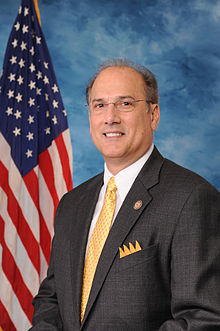Rep. Tom Marino is no longer in contention to be the nation's next drug czar, President Donald Trump announced on Twitter Tuesday morning.
Marino, a Pennsylvania Republican, was under fire this week after a joint investigation by The Washington Post and CBS News' 60 Minutes found he earned nearly $100,000 from the pharmaceutical lobbyists while backing legislation that would make it easier for drug companies to distribute opioids and circumvent the Drug Enforcement Agency.
Trump praised Marino in the tweet and at a press conference yesterday.
Rep.Tom Marino has informed me that he is withdrawing his name from consideration as drug czar. Tom is a fine man and a great Congressman!
— Donald J. Trump (@realDonaldTrump) October 17, 2017
Trump said at a joint press conference with Senate Majority Leader Mitch McConnell, R-Ky., on Monday that the White House was looking into the report about Marino and said that the congressman is a "great guy."

The joint news investigation dug into the Ensuring Patient Access and Effective Drug Enforcement Act, which was passed in April 2016. The law, according to the report, makes it nearly impossible for the DEA to freeze suspicious narcotics from pharmaceutical companies, and Marino was one of its chief champions.
RELATED: Hospital Impact—10 steps to develop and opioid prescription risk management program
High-ranking Congressional Democrats, particularly those representing areas hit hard by the opioid epidemic, had called on Trump to withdraw Marino's nomination following the reports.
Sen. Claire McCaskill, D-Mo., said in a statement emailed to FierceHealthcare that the withdrawal was the right call.
"I think this is the right decision, and I look forward to the administration nominating a leader that can aggressively bring to bear every tool the government has to confront what is unquestionably a national public health crisis," she said.
McCaskill has also introduced legislation to repeal the controversial law.
I look forward to working with @realDonaldTrump to find a drug czar that will serve #WV and our entire country.
— Senator Joe Manchin (@Sen_JoeManchin) October 17, 2017
.@realDonaldTrump - thanks for recognizing we need a drug czar who has seen the devastating effects of the problem. https://t.co/hTlkClveN5
— Senator Joe Manchin (@Sen_JoeManchin) October 17, 2017
Meanwhile, Trump also said at the press conference that the White House is planning a "major announcement," likely for next week, to officially declare the opioid abuse epidemic a national emergency.
"This country—and, frankly, the world—has a drug problem," Trump said. "But we have it, and we're going to do something about it."
Trump said back in August that he would declare the opioid crisis a national emergency but hasn't taken action on that promise since.
RELATED: What happened to Trump's plan to declare a national emergency on opioids crisis?
As the federal government grapples with its response to the opioid crisis, researchers at the University of Michigan have created a tool to make decisions on opioids a bit easier for surgeons. Prescribing recommendations were built based on survey data from surgical patients across Michigan and using UM data on pain management and surgical quality.
Researchers found that patients who are prescribed fewer opioids take fewer painkillers with minimal change to pain scores.
"It's embarrassing to admit this, but we've never had any evidence to inform how much opioid we prescribe to surgical patients," Jay Lee, M.D., a general surgery resident at UM Medicine who helped create the guidelines, said in an announcement. "These recommendations provide a crucial first step for improving the safety of opioid prescribing."